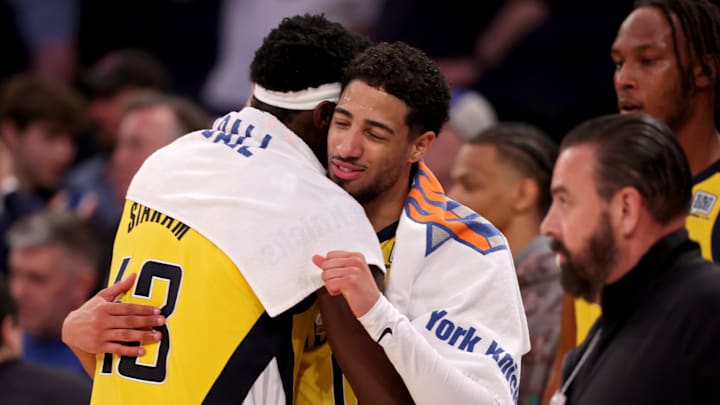Ben Sheppard
First Round Stats: 6 Games, 17.8 MPG, 5.8 PPG, 3 RPG, 0.7 APG, 0.5 SPG, 1 TOV, 1.5 FPG 50/50/80 Splits on 72.3% TS
Second Round Stats: 7 Games, 20.1 MPG, 5.9 PPG, 3.1 RPG, 1.3 APG, 0.4 SPG, 0.1 BPG, 0.3 TOV, 1.6 FPG 48.4/45/66.7 Splits on 63.4% TS
Conference Finals Stats: 4 Games, 21.8 MPG, 3 PPG, 2.8 RPG, 1 APG, 0.5 SPG, 0.8 TOV, 3 FPG 27.8/8.3/100 Splits on 32.5% TS
Stats: 17 Games, 19.7 MPG, 5.2 PPG, 3 RPG, 1 APG, 0.5 SPG, 0.1 BPG, 0.6 TOV, 1.9 FPG 43.7/38/77.8 Splits on 58.7% TS
If you asked Pacers fans before the season started which rookie they would expect to get consistent playoff minutes, most of them would probably say Jarace Walker, and for good reason. That makes it even more surprising that I am currently talking to you about the 26th pick's playoff performance, during which he played almost 20 minutes per game and stepped up on both ends.
Looking at the counting stats, nothing from Ben Sheppard stands out in any way. Averages of five points, three rebounds, and one single assist aren't blowing anyone's socks off anytime soon. However, it's how he got those numbers and the timeliness of his play that made him valuable to the team. When the Indiana Pacers traded Buddy Hield at the deadline, they were hoping for Sheppard to step up his play and replicate Hield's three-point shooting, with added defense. In the playoffs, that's exactly what he did.
In his first 13 games, Sheppard only had three nights of shooting less than 50% in games where he took at least one three-pointer. This level of efficiency and timely shot-making was invaluable down the stretch, especially when Indiana needed to get out of a slump.
Additionally, the level of defense Sheppard brought was leagues above anything Hield provided, as he was part of the group that helped slow down Jalen Brunson in the closing stages of the New York series. Instead of the 22-year-old rookie that he is, Sheppard played like a seasoned veteran in the first two rounds, making few mistakes and always being there for a stop and three-pointer.
This did not last for the entire playoff run, sadly. Sheppard was given the starting shooting guard role for the final two games against Boston after Tyrese Haliburton's injury and did not continue his streak of solid play. Instead, he only scored three points across two games and 45 minutes and went 1/6 from deep.
Part of this certainly had to do with the extra work Sheppard was putting in on the defensive end, as he was also tasked with guarding Jayson Tatum and Jaylen Brown at times, and looked completely outmatched. Of course, it is not a panic moment when a 22-year-old late first-round pick cannot keep up with two All-Stars, and it was about time for Sheppard to come down to Earth.
This should not be taken as much of a negative. For Sheppard to play at a level as high as he played at for the first 13 playoff games is very impressive. After all, if he is doing this at 22 years old with little experience under his belt, imagine what he can do down the line when he develops his two-way game and becomes smarter as a player.
